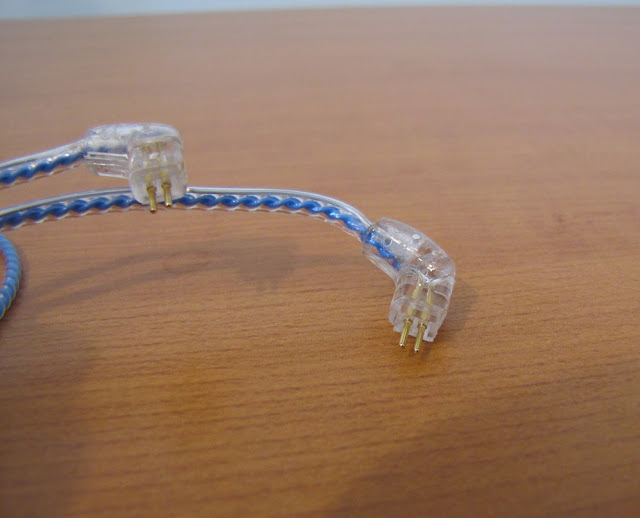Impressions: Wagnus Cable – BlueMoon (2-pin) IEM cable
Website: Wagnus (Japanese only)
Price: ¥25000 - 26000 (~U$D 210-220)
Design
The design is quite
simple but solid enough. It consists of a twisted cable and a plastic cover
from plug to plug. The plug is all metal with a plastic cover and quite sturdy,
the Y-split and slider are all plastic and a proper relief is lacking. The memory
wire earguide is easy to shape and fit. Unfortunately the 2-pin connectors only
fit flushed 2-pin sockets, but not recessed. The cable behavior is very average
with a strong memory effect and high microphonics. Quite disappointing for the
price considering that even 'stock' CIEM cables are so easier to handle.
Fit & Comfort
The memory wire is very
easy to shape for a fixed fit. The L-shape 2-pin plug works very well for a
more natural over-ear fit. The Bluemoon is very lightweight so very comfortable
around the ear. The rest of the cable is a bit springy and kind of annoying
when walking around, so the use of a clip is recommended, and also to lower the
cable noise.
Sound impressions
Note: Due the
non-standard 2-pin plug, the Wagnus Bluemoon was only tested on IEM/CIEMs, with
flushed 2-pin sockets; Jomo4, Lear A1d, and R8 to mention some. For Single and Balanced
comparisons, the PAW5000 was used as well.
The Bluemoon has a
fairly balanced sound, very lively with slight and wide V-shaped presentation.
It has a little extra sense of warmth on the lower frequencies and a strong but
coherent extra brightness at the upper end adding a better sense of air and
separation.
The low end sounds
bigger in body with a stronger impact, but tight and better textured. The improvement
in extension is definitely a strength on the Bluemoon, and while deeper, its
sub-bass response is not the deepest to find. The wider effect gives also place
for a both a better decay and a faster, less congested bass.
Midrange is less
dominant and relatively recessed but not too distant. It takes a slightly
cooler and leaner tonality with a thinner body in trade for better transparency
in the sound. Clarity is higher and detail offered in a more effortless way.
The main complain would be the vocals being less forward and missing their
sweet texture with the Jomo4.
The treble carries
greater detail, better resolution and much improved extension. It gives some a
bit of an analytical touch to the ED (BA driver for highs) on the Jomo4, which
is great for and sounds more effortless and more energetic and less smooth. It
comes at price, though, as the Bluemoon might accentuate some sibilance with
brighter music.
The most impressive (or
more interesting) characteristic of the Bluemoon should be the presentation of
the sound. Trying and comparing different aftermarket cables (and at different
price brackets), the Bluemoon showed a strong improvement on the stage dimensions.
It’s certainly gives a much wider and open sound, and while the height is good,
it loses in real depth. Air and instruments separation is very good, guitars,
cymbals and upper instruments in general have a stronger edge and notes are
generally cleaner, though it has a price, losing in imaging and 3D effect
having a more right and left channel separation.
(BlueMoon next to stock CIEM cable)


(with Lear Ad1)

(with AuGlamour R8)

(with Jomo4 v1)


(with Lotoo PAW5000)


(with Lear Ad1)

(with AuGlamour R8)

(with Jomo4 v1)


(with Lotoo PAW5000)
Value
Simply put, the Wagnus
Bluemoon cable has some good and bad features. Like the other Wagnus cables
I’ve tried it’s a strong microphonic effect, and a simple design and just above
average build quality for its price. Moreover, the wider plug and short 2-pin
connectors make limits the cable usage with any recessed sockets. However, in
terms of sound quality and presentation it definitely improves many aspects of
the sound, despite its more lively signature that it can make IEMs have. The wider
stage is worth noting, and scales even better with a balanced output. There’s
still the lack of availability and the high price.
Rating: 8.5/10









